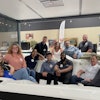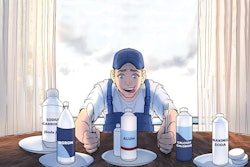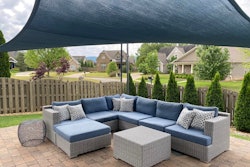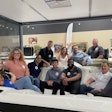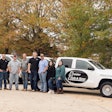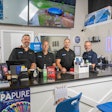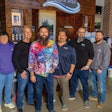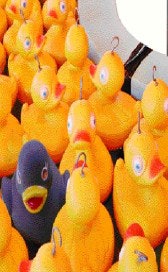
"The idea with big boxes is that they don't typically stock a wide range of products or brands within a category, and the big box doesn't usually offer the expertise or the service, so the only advantage they have is price," says Paul Entin, spokesman for Pool Shot Products, Ashtabula, Ohio. Compete with the big boxes by offering your customers things they can't get at the big stores: unique toys, high-end toys and more of what you already offer pool customers - great customer service and dedicated, personable salespeople. With a personal touch and a unique product, you'll find you don't have to compete at all on price, just fill a much-needed niche.
Be Unique
Your spouse's 40th birthday is coming up, and you've got to get a cake. There's a big discount store, let's call it Cost-Mart, in the local strip mall that has satisfactory, slightly bland special-occasion cakes, and boy are they cheap. Then there's the local bakery, where you sometimes splurge on the good bread, that has beautiful, personally designed cakes, at a higher price, but they are unique and delicious. Which one will you get?
Low price is undoubtedly a big draw for consumers, but dealers think it's more important when it comes to decision-making than it actually is. "Marketing studies show consistently that price is never the most important factor in a purchase decision," says Entin. Buying something unique increases its value and makes the purchase more meaningful; that's true of both your purchase and of your customer's.
Many manufacturers realize that their dealers need a way to give customers unique toys that they can't get at a discount store, and offer dealers exclusive products. "The dealers that are wise and are growing their businesses understand that they have to grow with the mass merchants and stock stuff that they know that Target or Wal- Mart doesn't stock, or sell the more technical stuff that they know the mass merchants will never stock because they'll never go to that price point or that technical category," says Scott Severson, Aviva Sports' vice president for sales and marketing. Aviva makes a host of products for mass merchants, but also offers a line sold exclusively to dealers.
"If we make anything for mass merchants, we make it different from the rest of our product line, so we can give the dealers an opportunity to compete," says Severson. "We know that we have an innovative line of products. We're going to get phone calls from Wal- Mart and Target. And obviously in some respects we want to do business with them, but we just want to make sure we're selling [dealers] products that are different, to differentiate themselves. The consumer may see a product at Target and then when they go buy their chemicals at a pool dealer, they also may see Aviva, but they'll see a different product." Some dealers choose to sell toys that are marketed by mass merchants anyway, but Severson says it's important to let them know when they will be competing on price. "It's safe to say that 80 to 90 percent of the products that Aviva sells are directed to dealers only, and when we go to a dealer show, I'll tell people, 'All this stuff's typically dealer- only, but this product and this product are also sold at Target,' for example," says Severson. "Some dealers will say, 'Hey, at least now I'm sensitive to that, and I'll just price it so I can compete with Target.'"
Though at first blush it may not seem to be, selling exclusive lines to small dealers is often also a savvy business decision for manufacturers. Relatively new to the pool category, Huffy Sports has gone this route, hoping to help dealers cash in on a strong brand name. "When dealers send you orders, they can be $1,000 and less, and we're a retail-driven company," says Tim Reinecke, Huffy's manager of pool sales. "So the big focus is, why would we kill ourselves with a gazillion $1,000 orders as opposed to selling to the big mass stores? And the answer is, our objective is to grow the dealer business because we know that it is an evolving, growing category. We feel that it can be a profitable category, and by giving them targeted-type products that we don't sell in retail en masse, we feel that we can grow that category through that decision."
Another reason manufacturers like to sell exclusively to dealers is the personal relationship that can blossom. "If our products sell well, the relationship is longstanding," says Severson. "The relationship you can build with a pool dealer maybe is the same relationship you can build with Target, but it's on a much more personal level, just because they're so easy to have access to. You can see them at shows, and you can call them on the telephone, whereas with Target, it's just so much more of a huge business that you just don't know if year in and year out, you're going to retain that business."
Be Luxurious
Besides selling unique items, dealers can also distinguish themselves from mass merchants by selling high-end toys, even ones that are sold at Cost-Mart. "When you're talking about a high-quality product, people need to understand the difference in having a long-lasting product which doesn't have to be replaced, versus going to the store, spending $19 on a game and having it break in a few months," says Entin. "That's a concept that is much more effectively presented in a pool retail setting, where you can have an expert retailer that the customer has some trust in."
By positioning themselves as the place where people go for anything related to their pools, dealers give themselves an advantage over enormous chain stores when selling high-end items. "When people buy a pool product or accessory in a big-box store, nine times out of 10 they didn't go to the store to purchase the pool product," says Entin. "They happened to be there for whatever they were buying, and they saw it there and purchased it on impulse. That's going to happen less often with a high-end, luxury kind of product, or a bigger ticket kind of product." Wise dealers take advantage of the fact that customers already have pools on their minds when they come into the store.
Selling big-ticket items also gives dealers a much stronger profit margin. "I mean, if they're going to sell a $5 item that costs them $3, yeah, the margin's real strong there," says Reinecke. "But if they're going to sell a $199 piece of equipment that costs them $105, wouldn't they want to sell the high-end system all day long? A pool dealer is going to make a substantially larger profit selling a basketball system versus multiple $5 items; they have to sell a lot of $5 items."
With floor space at a premium, selling high-end items also helps dealers make the most of it. "Dealers clearly need to make every square foot of retail space count, especially now that it's so much harder to get people into the store. If they're not taking advantage of every square foot, then they're losing money," says Entin. And just because an item is more expensive doesn't preclude it from the impulse purchase category. "You have to upsell wherever possible. That's why it's so important to select the right products, the ones that will deliver high margins and actually spark impulse purchasing. If someone is about to spend $15,000 to $25,000 on a pool, it's very easy to spend $695 more."
Displaying high-end items correctly also influences a customer's decision to buy. Severson recommends inflating Aviva's slides on the showroom floor. "Inflate the product and then on a Saturday when it's going to be busy, hook the garden hose up to it and actually run the product, so consumers walk in and actually see the slide with water cascading down the front of it."
Be Yourself
As already mentioned, one of the greatest assets a smaller dealer has when selling toys, be they unique lines or high-end hoops, is himself. Offering customers not only that personal touch, but also knowledgeable, expert salespeople will make the decision to spend hundreds of dollars on a toy that much easier. "Buying luxury products in a big box is still often a risky proposition, but the smaller dealer, if they're positioned as a credible pool expert, they can more reasonably make the sale, and they can make their customer feel much more confident in making that purchase," says Entin. Though they may save a little money by buying the same product in a big box, by selling themselves along with the product, dealers are in a position to charge a little bit more.
"The price points that mass merchants are trying to achieve normally have to be lower, whereas the dealer can offer higher price points because they have salespeople there that can explain the features and benefits of the product that justifies that higher price point," says Severson.Marketing themselves as the place to go for pools takes vigilance and dedication on the part of the dealer. Throughout the year, dealers must make sure their stores stay at the forefront of customers' minds. "It's really a marketing issue in that the smaller dealer needs to develop a loyal customer base. Obviously, you have to have quality products and superb customer service. But just as importantly, that smaller dealer has to keep his name in front of customers year-round, with marketing programs, with advertising, direct mail, e-mail, in-store promotions and point-of-purchase displays, so that when the season rolls around and people are ready to open their pools and everybody's excited and the kids can't wait, where are they going to go? We need to make sure they go back to that smaller dealer," says Entin.
Dealers don't have to compete with the sprawl marts when it comes to selling toys, because realistically, they can't - they will be undersold. But by shifting the focus away from price and toward their strengths, dealers can shift the playing field (pun intended) in their favor. Offering customers toys they can't get anywhere else will bring traffic into the store, and offering them high-end items with guaranteed expert advice will ease their minds about spending a little more. Dealers would also do well to remember why most of their customers built pools in the first place - not as architectural showpieces, but to have fun.
"Toys bring families together and keep people smiling at the pool," says Severson. "At the end of the day, it seems like families want to come together and get away from the stuff that gets them down in life and have a good time."



















